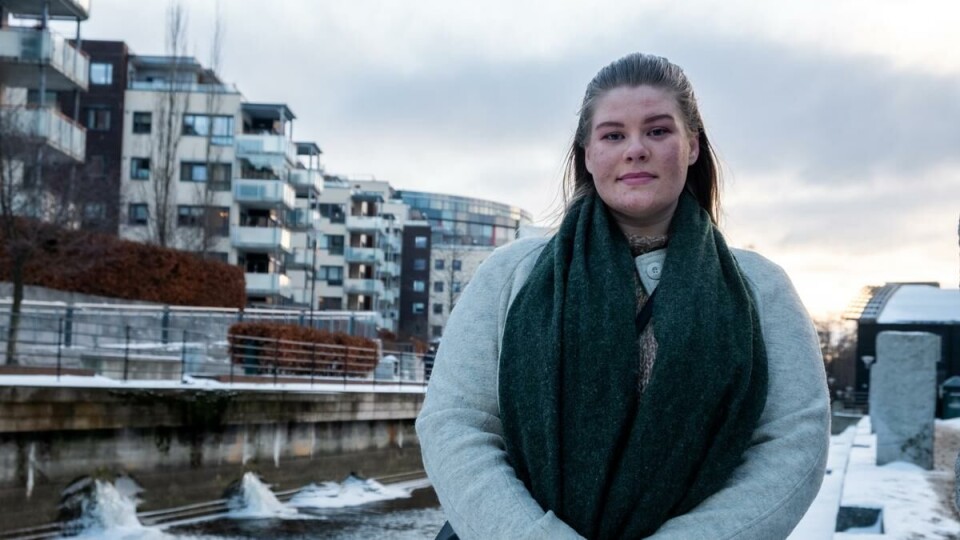Dissatisfaction in the education programme:

93 students have gathered behind complaint
Almost a hundred education students have signed a complaint directed at the Department of Teacher Education and School Research. The students describe poor communication and a department that does not listen to them.
Every autumn, the education students (lektorprogrammet) in their second year at UiO have their first experience with the practical aspect of their degree through the course PROF1015, where they are sent to schools to observe and teach. As a consequence of the pandemic, the autumn semester did not go as planned, to the dissatisfaction of many students.
– We were told where we would have our practice 24 hours in advance, says Gina Rønning Sørbye (22).
Sørbye studies education, with specialisation in Nordic and history, and has signed two complaints related to the execution and planning of the course. She reacts to the way the semester was structured in general and the lack of hospitality from the department.
The first complaint is about the structure of the exam, while the other complaint is more generally about the course, information flow, execution of the practical aspect, and assessment. The complaints have gathered 93 and 61 signatures respectively in a module with 267 students in total.
Sørbye describes an amputated internship period, where some students only got one day before it was over. Normally, the students are in internships for large parts of the semester. What you observe during this time is used, with the curriculum, to write your exam.
As a replacement, the institute decided to do a so-called «DigDag», a form for alternative classroom practice that runs digitally. The students also got an hour-long video of a classroom situation to analyse.
Confusion and dissatisfaction
When the students couldn’t use observations from their internship period to write their assignment, they instead got three videos of classroom teaching that they would use as case.
– Usually, the exam is based on an interview with a pupil, but now we looked at cases and discussed what they were doing in those cases. That’s not too bad, but they’re two to four minutes long, and there’s little material to extract from it, Sørbye says.
We were told where we would have our practice less than 24 hours in advance
Gina Rønning Sørbye, education student at UiO
Dina Knudsen (21) is also in her second year of the education programme and is the author of the first complaint that gathered 93 signatures. Her complaints are mainly directed towards the exam and the department’s handling of the students’ dissatisfaction.
– The problem boils down to us feeling like we are not listened to when we are concerned about how the exam has been made, Knudsen says, and continues:
– The cases were the same regardless of specialisation. In other words, the subject didactic curriculum was not relevant. For many, there was no relevance between case and subject didactic curriculum.

Didactics is related to pedagogy and is the science of learning and teaching. Subject didactics is didactics which is related to specific fields, for example history didactics or foreign language didactics.
According to Knudsen, many fellow classmates heard different things from different seminar leaders.
– It seemed like the seminar leaders didn’t understand the situation either, she says.
Knudsen says the initiative for the complaint began when she was told by the seminar leader to send an e-mail about things she didn’t understand. Before she sent the e-mail, she got some people from her study group to look at it. The rest of the study group wanted to sign it, and it snowballed from there. Suddenly, almost half of the students in the course had signed and it seemed more natural to send it as a complaint to the department.
– We had two demands: remove the requirement to include subject didactic literature and use pass or not pass rather than grades, Knudsen says.
The complaint did not succeed and the students have therefore decided to send a new and more formal complaint to the department.
– What do you hope to accomplish by submitting a complaint about a course you’ve already completed?
– Partly, we hope that the department will listen to us. Many of us felt like we were not listened to, and it would be nice to get some recognition for the mistakes that were made. Former students also say that there has been much confusion concerning this course, so we hope that it will be easier to avoid such situations in the future.
@sit: Many of us felt like we weren’t listened to, and it would be nice to get some recognition for the mistakes that were made. @sitatbylinel: Dina Knudsen, education student at UiO
Student association: Defends the department
When the complaint got such significant support from the students, they chose to send it through the student association for the education programme (LPU). They are also helping the students with the new, more formal complaint that will be sent to the Department of Teacher Education and School Research.
– We have continuous communication with the department, and hope that students contact us as soon as there is something to report, says Frida Gjedtjernet Isaksætre (23), leader of LPU.
She adds that the situation of the students in PROF1015 has been on the agenda for every meeting in the student association last autumn.
– There are naturally challenges with internships. The dissolution of the internship period has been a theme the entire autumn. The logistic puzzle the department faces before each autumn is difficult to deal with, and it has offered new challenges in the corona situation, Isaksætre says.
She says LPU received the petition and passed it on to the department, and they then received a report from the department which was sent back to the students.
– After this, and after the exams, we have talked about a more proper complaint about the course. We have received a draft for a complaint and said that we will help with its creation and make sure it gets to the right place.
Isaksætre experiences that the students react to a lack of information and poor communication flow. In this context, Isaksætre comes with a defense of the department:
– We who talk to the department regularly have also known about the challenges the department is actually facing. It’s hard to give students good information when you do not have information to give.
She points to the situation of schools that suddenly did not want to host students for practice, or that didn’t want to accommodate for as many students as initially agreed.
– It’s hard then to communicate information last minute when it is such an uncertain situation, she says, and adds:
– But I understand the students’ frustration really well and I would probably have felt the same, but it is a difficult situation.

Department of Teacher Education and School Research: Understands the frustration
Kirsti Engelien, academic director for the education programme at UiO, writes in an e-mail to Universitas that the department fully understands that the students are left with frustration after a challenging semester that was greatly affected by the corona situation.
She points out that the education programme is one of UiO’s greatest interdisciplinary study programmes, five faculties work together to offer 49 different courses of study and it is a big logistic puzzle.
– The whole structure for PROF1015, including teaching at campus, internships, and exam, is designed to adapt to this complexity. We have very little room to make changes, she writes.
On the execution of the internship period, Engelien underlines that the corona situation affected the autumn much more than it was possible to predict, and that schools in the first weeks of the semester told them that the capacity to receive students was reduced. Some schools could not receive students at all.
– As an educational institution we cannot force schools to receive students, and this is not optimal either, she writes and adds:
– The consequence was that we had to make changes in the course PROF1015 in order to accommodate for all the students in the best way possible.
She underlines that subject didactics, pedagogy, and internships, are integrated components of all exams. She writes that to explicitly ask students to exclude subject didactic literature from work with an exam is therefore not optimal from a professional academic perspective.
– In hindsight, we see that it may have contributed to confusion among the students that they, in the assignment, were encouraged to use all study literature, both pedagogy and subject didactics, but that we in the assessment criteria underline that the latter is not emphasized. This is an important lesson that we will carry with us, she says.
Engelien writes that the department recognises the students’ complaint, and will carry it with them in further work.
– Of course, we take complaints very seriously, and the petition from the 93 students is incorporated in our data material that is part of the course evaluation.


































